
Book a Consultation
Thank you!
Your form has been sent successfully.

According to the American Society of Clinical Oncology, oral and oropharyngeal cancers are the most common head and neck cancers that occur in the cells of the oral cavity and the oropharynx (middle part of the throat behind the oral cavity). Oral and oropharyngeal cancers are strongly linked to the use of tobacco products like cigarettes, chewing tobacco, and excessive intake of alcohol. The most common sites of oral cancer are the tongue, gums, tonsils, the floor of the mouth, and the oropharynx.
Based on the origin of the cancerous cells, oral and oropharyngeal cancer types can be classified as follows :
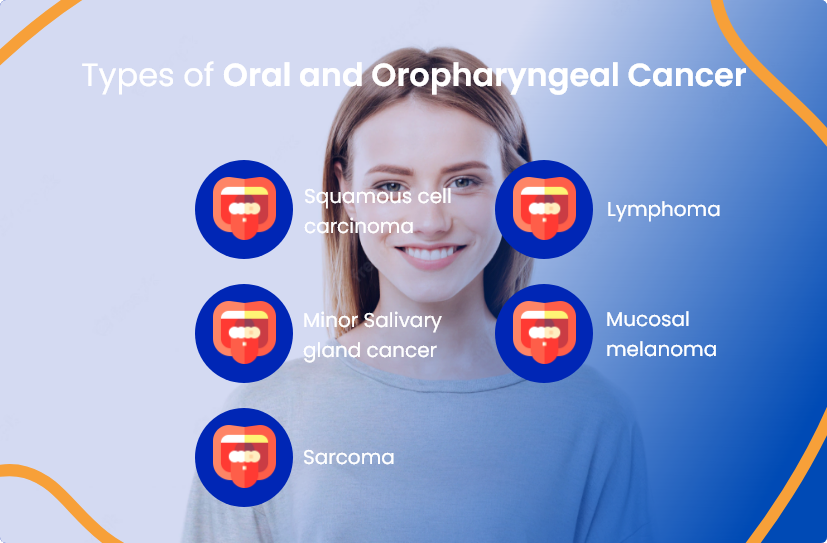
Squamous cell carcinoma is the most common type of oral cancer that develops in the flat squamous cells of the lining of the mouth, tongue, lips, and throat. If cancer is found only in the squamous cell layer, it is called carcinoma in situ. If it invades deeper layers, it is called invasive squamous cell carcinoma.
Lymphoma develops in the lymphoid tissue (part of the immune system) of the tonsils and the base of the tongue.
Minor salivary gland cancer originates in the tissues lining the minor salivary gland of the mouth and throat that produces saliva.
Mucosal melanoma is a rare form of cancer that develops in the mucous membrane that lines lips, mouth, and throat.
Sarcoma is an uncommon malignant tumor that develops in the blood vessels and connective tissue of the oral cavity and throat.
Common signs and symptoms of mouth cancer may include:
 Unhealed chronic ulcers in the mouth or on lips
Unhealed chronic ulcers in the mouth or on lips
 White or red patch on the tongue, tonsils, gums, and lining of the mouth
White or red patch on the tongue, tonsils, gums, and lining of the mouth
 A lump in the neck
A lump in the neck
 Crusty thickening of the mucosa lining lips, mouth, or throat
Crusty thickening of the mucosa lining lips, mouth, or throat
 Persistent sore throat
Persistent sore throat
 Hoarseness
Hoarseness
 Numbness of tongue or mouth
Numbness of tongue or mouth
 Pain or bleeding in the mouth
Pain or bleeding in the mouth
 Difficulty in chewing or swallowing
Difficulty in chewing or swallowing
 Pain during movement of jaws or tongue
Pain during movement of jaws or tongue
 Loosening of teeth
Loosening of teeth
 Changes in speech
Changes in speech
 Unexplained pain in ears and teeth
Unexplained pain in ears and teeth
 Fatigue and weight loss
Fatigue and weight loss
The treatment options depend on the type and stage of oral cancer and the overall health of the patient.
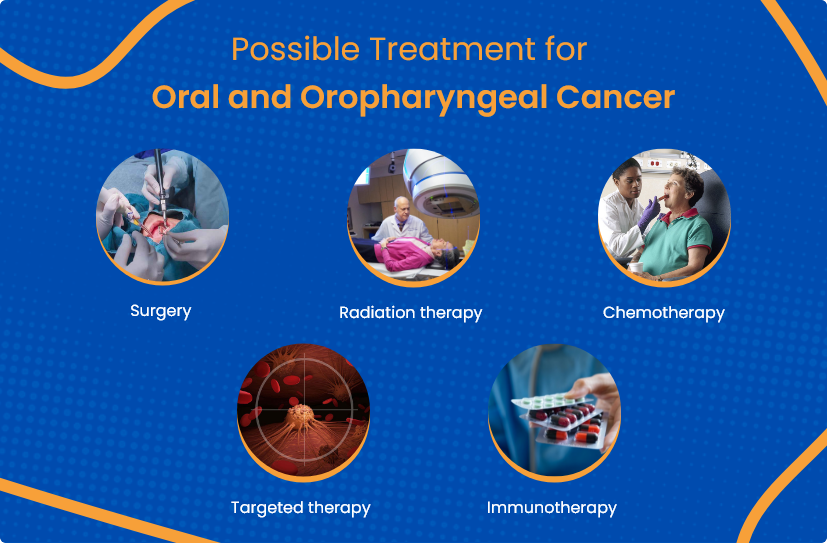
Surgery involves the complete removal of the tumor with some surrounding healthy tissue. It is the most common oral cancer treatment. The extent of surgical removal depends on the size and spread of the cancer. Depending on the location and size of the tumor, oral cancer doctors may perform a minimally invasive surgical technique called transoral robotic and transoral laser microsurgery.
Radiation therapy uses high ionizing rays to destroy cancer cells that are otherwise inaccessible by surgery. Radiation can be delivered via an external machine outside of the body (external radiotherapy) or by surgically placing small radioactive pellets in or near the cancer-affected areas (brachytherapy). External beam radiation is the most commonly used form of radiotherapy to treat oral and oropharyngeal cancer.
Chemotherapy uses anti-cancer drugs injected intravenously or administered orally, which enter the bloodstream to reach and destroy rapidly growing cancer cells.
Targeted therapy blocks the spread of cancer by explicitly destroying the specific cell proteins or genes that contribute to the growth of cancer. It causes fewer side effects and spares healthy cells because of its focused action.
Immunotherapy treatment, also called biologic therapy, uses a specific protein to enhance the patient's immune system cells' ability to target and destroy cancer cells.
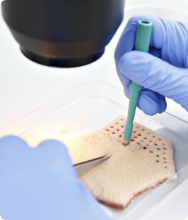
A biopsy provides a definitive diagnosis of cancer. The procedure involves the removal of a tissue sample for microscopic examination. Anesthesia is administered before the procedure to prevent pain. A biopsy can be performed using a fine needle to remove tissue fluid or cells from the suspicious area (FNAC) or surgical removal of a part of the tumor.
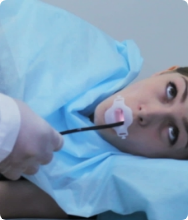
The oral cancer doctor gently inserts a thin, lighted, and flexible tube with a camera called an endoscope through the nose or mouth into the throat to examine the structures inside the neck. Anesthesia is administered before the procedure to prevent pain and gagging.

X-rays are taken after the patient swallows a liquid containing barium which coats the oral cavity and throat and appears highlighted in white on X-ray film. It provides a detailed view to determine any abnormalities in swallowing patterns.
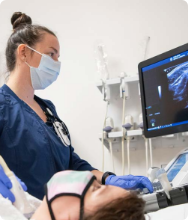
High-intensity radiation is used to produce detailed 3-dimensional computerized images. They are used to locate and measure the tumor's size. Various imaging tests used are:
The cancer specialists at ACTC in Florida offer outstanding patient care by prescribing personalized and evidence-based treatment plans tailored to individual patients' needs. We aim to foster a positive environment that focuses on physical and mental health throughout a cancer patient's journey.
The following are our providers who you can consult at ACTC:

MD, Hematology & Oncology

MD, Ph.D., Hematology/ Medical Oncology

MD, Radiation Oncologist

If you or a loved one has been diagnosed with oral and oropharyngeal cancer, a detailed discussion with your primary physician will help you understand your condition better. Your primary care doctor can then refer you to an advanced specialty center, such as ACTC in Florida.
As one of Florida's best cancer centers, we understand how a cancer diagnosis and therapy impact a person's physical and emotional well-being. Therefore, we work hard to make patients and their families feel secure. We understand how imperative it is for you and your loved one to make informed choices and play an active part in your medical care. We at ACTC strive to support you at every step of diagnosis, staging, treatment, and long-term follow-up in one convenient location. Our cancer specialists are backed up by qualified clinical staff with over two decades of experience and a reputation for providing personalized oral cancer treatment.
Schedule a consultation by calling
 352-345-4565
352-345-4565
A long-standing unhealed sore in the mouth, red or white patch on the gums, tongue or lining of the mouth, lump (or thickening) in the neck or cheeks are the early signs of mouth cancer.
The two main risk factors for oral cancer are the use of tobacco and increased intake of alcohol. Other risk factors include prolonged sun exposure, viral infections, poor oral hygiene, weakened immune system, genetic factors, and previous history of oral cancer.
According to the American Society of Clinical Oncology, there is no specific measure to prevent oral cancer. However, stopping the use of tobacco products (like cigarettes and chewing tobacco) and alcohol is essential in reducing the risk of oral and oropharyngeal cancer.
If you are based in (or near) Florida, you can schedule a consultation with an ACTC oral cancer doctor by calling 352-345-4565 or completing the online form here. (we can provide a link to the form here)
Schedule a consultation by calling
 352-345-4565
352-345-4565